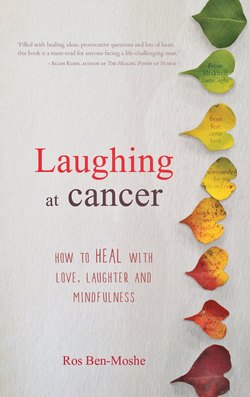Читать книгу Laughing at Cancer - Ros Ben-Moshe - Страница 15
На сайте Литреса книга снята с продажи.
Оглавление10 June 2011
Why can’t it be the ‘little c’ instead?
The language around cancer really riles me. It’s all-pervasive: ‘she had cancer’, ‘he had cancer’, as opposed to being contained and specific, for example, she had a cancer, he had a cancer. Saying a person has cancer creates a misperception that a person’s whole body, as opposed to a contained, specific area, is cancerous. Whilst in a minority of cases, if someone has terminal cancer (i.e. it has spread to the point of no containment) this may be true, in the majority of cases, it isn’t.
It’s time to change the default language around cancer. Acknowledging someone has a cancer is far more empowering than saying she or he has all-consuming cancer. The same can be said about other conditions. Referring to a person ‘with a disability’ as opposed to ‘disabled’, or who ‘has diabetes’ instead of ‘diabetic’, emphasises and empowers the healthy part of that person. It focuses on the areas that are functioning well rather than the sickness. In my case, and all being well, this will be just a small malignant pocket within the bowel.
It’s an important clarification and one I wanted to impart to the boys. So this afternoon, having decided on my course of action, we held a family meeting. Seated around our dining table, I downplayed the potential seriousness of my situation, explaining, ‘I have a small polyp in my bowel and a few of the cells in and around it have some cancerous cells. It should be fine, but just to be on the safe side, I am having a larger operation. It’s a very big operation, and for a while it will appear like I’m sicker than I really am.’
We steer clear of statistics, allaying chaos and fear, navigating instead towards hope and stability. We sidestep the ‘what ifs’, deciding that if they ask, we will then respond. The subtext is very clear: ‘Mum does not have the Big C, a small part of her bowel does!’
The last thing I want and fear they will hear is, ‘Your mum’s got cancer.’ With the menacing grapevine dangerously encroach-ing we tell them people may jump to conclusions, not fully understanding my situation. One of my friends has already enthusiastically offered to go wig shopping with me, making my natural hair well and truly stand on end.
Containing the cancer to a specific body part enables the rest of my body to be in a state of well-being, optimising healing. Succumbing to an overall diagnosis of cancer dilutes the healing effect, weakening my whole self. The more harmonious and positive my state of mind, the better.
We will deal with the mountain if it presents itself; at the moment it’s a rather large and inconvenient molehill—to put it mildly. It’s breaking down the ‘too hard basket’ into wicker strands. It doesn’t diminish the huge ramification of a cancer diagnosis, which no semantics of language can change, but it does relieve some of the burdensome weight it necessarily brings. Surely it’s psychologically easier to recover from something specific rather than an all-pervasive everything?
I am not malignant; the polyp in and around one small area of my bowel is: 21mm to be precise! Thinking ahead I’m wondering if I will have to tick the ‘Have you had cancer?’ box for any future medical appointments or health insurance forms. For now that box categorically remains blank. I don’t want to be scarred for life with a full-blown cancer diagnosis.
Have you had a cancer diagnosis, or been given any other chronic illness label?
……………………………………………………………………………
……………………………………………………………………………
……………………………………………………………………………
Have you given any thought to how you refer to your illness?
……………………………………………………………………………
……………………………………………………………………………
……………………………………………………………………………
Can you think of another way to refer to your situation that empowers your body and your mind’s capacity to heal?
……………………………………………………………………………
……………………………………………………………………………
……………………………………………………………………………
